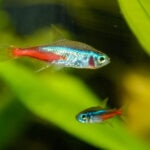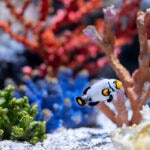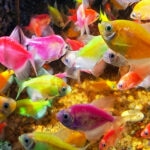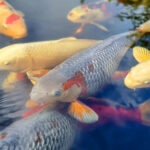Aquarium Slime Disease
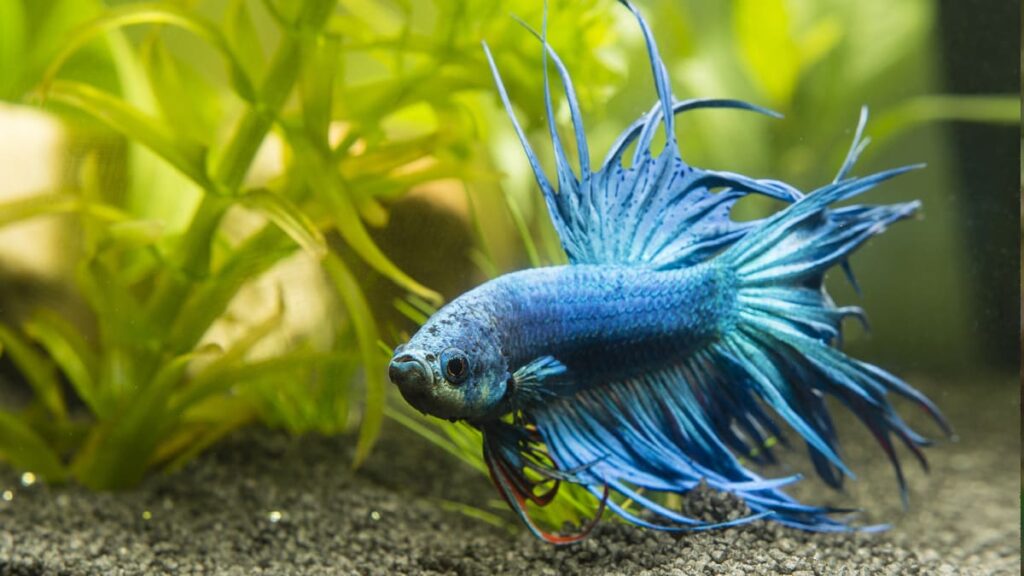
Photo by Chewy
Slime disease is a name given to various parasitic infections of the skin that cause freshwater aquarium fish to produce abnormally high quantities of mucus. Slime disease stresses aquarium fish and makes them vulnerable to potentially lethal secondary infections.
Slime Disease Identification
The increased production of mucus in aquarium fish will be visible as cloudy patches on the skin, particularly along the flanks. Because of increased mucus production around the gills, affected aquarium fish often show signs of respiratory distress such as heavy or labored breathing. Irritation of the skin causes aquarium fish to scratch themselves against solid objects. Lethargy and loss of appetite are also common as the aquarium fish becomes increasingly stressed. In extreme cases obvious physical damage to the skin occurs, and secondary infections such as fungus and finrot can develop.
Slime disease in marine fish is usually caused by a different parasite, Brooklynella hostilis, sometimes called clownfish disease after the fishes it most commonly affects.
When fish are stressed, they may produce extra mucus or exposed to toxins and irritants in the water such as copper, though in such case their sliminess is generally lower than when affected by slime disease. Note also that some fish are naturally slimy (e.g., eels) and others may produce extra mucus at particular times (e.g., parrotfish before going to sleep).
Slime Disease Pathology
Slime disease in aquarium fish may be caused by several different protozoan parasites. These include Ichthyobodo necator, Ichthyobodo pyriformis, Chilodonella spp., and Trichodina spp. Identification of the parasite involved in a particular case of slime disease in aquarium fish requires analysis of skin and mucus samples under a microscope, so will be beyond the abilities of most hobbyists. Veterinarians specializing in aquarium fish health will be able to carry out this work for the fishkeeper if required.
Ichthyobodo necator and Ichthyobodo pyriformis were formerly known as Costia necatrix and Costia pyriformis, and consequently many aquarists continue to refer to slime disease infections as “costia” or “costiasis.” More accurate terms for slime disease in aquarium fish would be ichthyobodosis, chilodonellosis or trichodinosis, depending on the parasite involved.
Slime Disease Life Cycle
There are some important differences in the life cycles of the aquarium fish slime disease parasites, but the life cycle of Ichthyobodo necator is broadly representative. Ichthyobodo necator has a free-living swimming stage and a parasitic feeding stage. During the free-living stages it swims through the water using its two flagella until it finds a suitable host. It needs to find a new host within a few days or it will die. Once attached to the host the parasite begins to feed on skin tissue of the aquarium fish, mostly but not entirely dead skin cells.
Ichthyobodo, Chilodonella, and Trichodina are probably present in most aquaria and in small numbers don’t do any harm. Slime disease symptoms become manifest only when aquarium fish are so stressed or weakened that their immune systems cannot keep the population growth of these parasites in check.
Slime Disease Treatment
Slime disease in aquarium fish needs to be treated promptly because heavy infections make it easier for secondary infections such as finrot to become established. Once that happens, the outlook for the aquarium fish becomes much worse.
Slime Disease Medications
Commercial medications for slime disease are available, formalin being the most common active ingredient; copper sulfate and potassium permanganate are also used. These aquarium fish medications should be used as stated on the packaging, paying particular attention to dosages, durations, supplemental aeration, and the removal of carbon from the aquarium filter before treatment (if necessary).
Slime Disease Salinity
The parasites that cause slime disease in aquarium fish are sensitive to salt, and slime disease can usually be treated through a combination of raising water temperature to 86 degrees Fahrenheit (30 degrees Celsius), the addition of salt at a dose of 0.4 to 0.7 ounce per gallon (3 to 5 grams per liter), and improving environmental conditions. Warm, saline conditions should be maintained for 7 to 14 days. Not all aquarium fish tolerate salt equally well. Livebearers, killifish, cichlids, goldfish and koi are fairly tolerant of salt, so the higher dose can be used safely. Soft water aquarium fish such as tetras, barbs, rasboras and gouramis are less tolerant of salt, so the lower dose should be used. In either case raise the salinity slowly, ideally in stages across a day so that the aquarium fish and aquarium filter bacteria can adapt to the more saline conditions. Some strains of slime disease parasites, Ichthyobodo necator, are tolerant of brackish water and cannot be treated using salt.
Saltwater Dips for Slime Disease
Saltwater dips are not a reliable treatment for aquarium fish slime disease on their own but they can help to speed up recovery. The salinity needs to be between 10 to 35 ppt to work, i.e., about one-third normal seawater salinity through to full-strength seawater. Apart from the addition of salt, the water should otherwise have the same temperature, pH and hardness as the aquarium. Dip the aquarium fish for 2 to 20 minutes. Salt-tolerant aquarium fish endure this treatment better than soft water fish, and small fish become stressed more quickly than large fish, so take care to remove the aquarium fish if it shows signs of severe distress, such as rolling over.
Slime Disease Prevention
Because the parasites that cause slime disease in aquarium fish are latent in most fish aquariums, the appearance of slime disease is an indication that the aquarium fish have become stressed, typically because of poor environmental conditions. The best way to prevent slime disease is to provide aquarium fish with appropriate living conditions. Overstocking and exposure to toxic nitrogenous wastes (ammonia, nitrite and to a lesser degree nitrate) are particular issues to be considered when determining the triggering factors behind an outbreak of slime disease.
Posted by: Chewy Editorial
Featured Image: Lapis2380/Shutterstock
